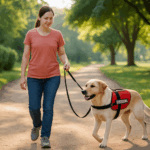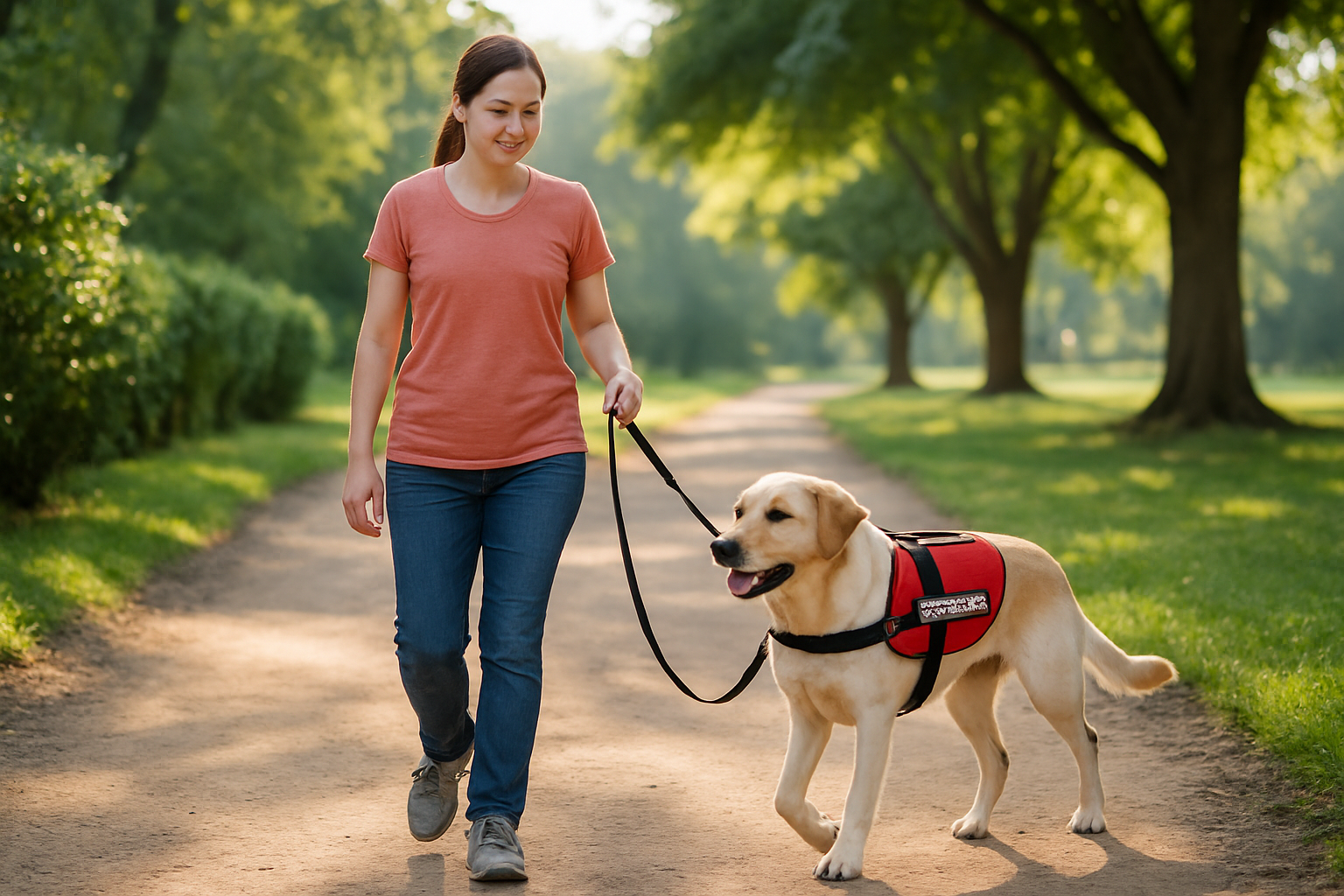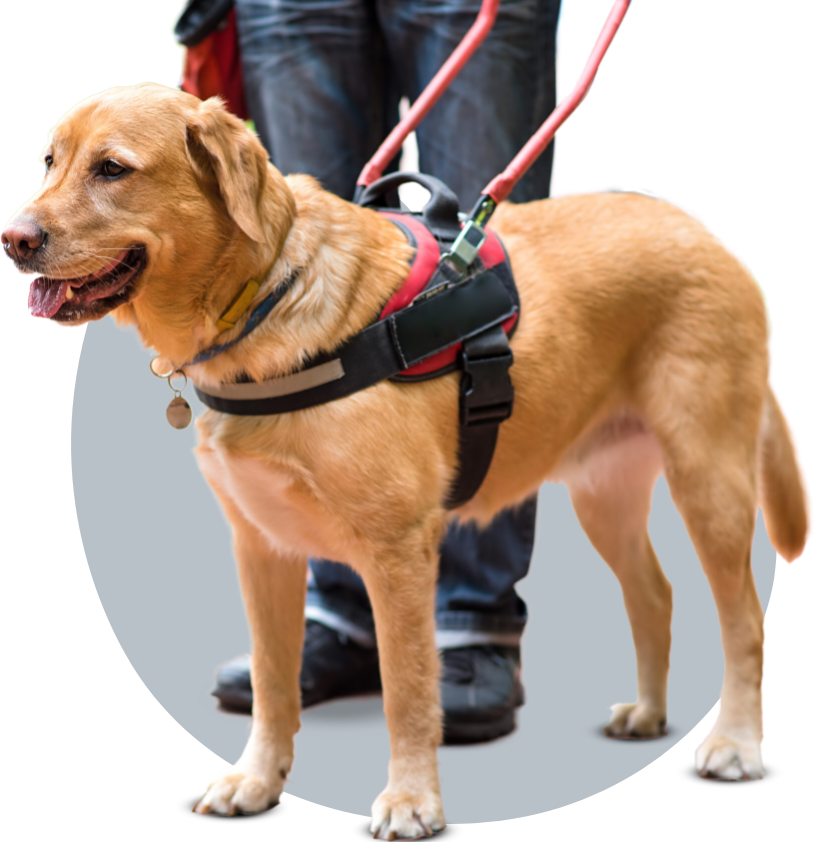Everything You Need to Know About Service Dogs

What Is a Service Dog?
Service animals are dogs trained to perform major life tasks to assist people with physical or severe psychiatric impairments/disabilities. Service animals are sometimes referred to as assistance animals, assist animals, support animals, or helper animals depending on the country and the animal’s function.
What Is a Physical Impairment?
A physical impairment is any medical disorder, condition, disfigurement or loss affecting one of the body systems, such as neurological, musculoskeletal, special sense organs, respiratory (including speech organs), cardiovascular, reproductive, digestive, genitourinary, immune, circulatory, hemic, lymphatic, skin, and endocrine.
Examples of conditions that are impairments: AIDS, and its symptoms; Alcoholism; Asthma; Blindness or other visual impairments; Cancer; Cerebral palsy; Depression; Diabetes, Epilepsy; Hearing or speech impairments; Heart Disease; Migraine Headaches; Multiple sclerosis; Muscular dystrophy; Orthopedic impairments; Paralysis; complications from Pregnancy; Thyroid gland disorders; Tuberculosis; loss of body parts.
What Are Major Life Tasks?
These activities consist of functions such as caring for yourself, (including, but certainly not limited to bathing, dressing, shaving, preparing a meal, and going to the restroom), performing manual tasks, eating, sleeping, standing, walking, lifting, reaching, bending, seeing, hearing, speaking, breathing, learning, reading, concentrating, thinking, communicating, interacting with others, and working.
As a result of the Americans with Disabilities Act Amendments Act, major life activities now also include the operation of any major bodily function, including, but not limited to functions of the immune system, normal cell growth, digestive, bowel, bladder, neurological, brain, respiratory, circulatory, endocrine, and reproductive (procreation) functions.
Major life activities do NOT include the following:
- Caring for others
- Driving
- Ability to have a relationship
- Grocery shopping
Do You Need a Letter from a Doctor to Qualify?
It isn’t necessary to possess a letter from a physician that states you are disabled and require a trained service dog, but if someone legally challenges a person claiming to be disabled, proof of the disability will be necessary at that point. What you must be prepared to do when in public is confirm you are disabled and provide credible verbal evidence of what your service dog is trained to do.
How to Get a Service Dog

There are organizations who help pair a service dog with a disabled handler, and the training process takes time, substantial financial investment, and patience. The training begins with basic manners and continues to involve thorough socialization, impulse control and the specialized skills required to support their handler. The formal training procedure typically culminates with passing the Public Access test and Canine Good Citizen Test, which assesses the capability of the dog to be a proper, unobtrusive helpmate in public. Then, the handler and dog are matched and train together to be a working team. The scope of work that goes into preparing a service dog for the responsibility of assisting their handler and acting properly in public goes well beyond what usually occurs in pet dog training. People with disabilities have the legal right to take their service dog to any area where the general public is allowed, from movie theaters to hospitals, even when pets aren’t allowed.
Some handlers train their own pets, but typically begin with public behaviors (good dog manners), obedience, and finally task-specific training. This is a cost-effective method of attaining a service dog.
What Are Your Protection and Rights with a Service Dog?
The Americans with Disabilities Act (ADA), as amended by the ADA Amendments Act of 2008 (ADAAA), 42 U.S.C. 12101, prohibits discrimination on the basis of a “disability” in several critical areas. Those areas include:
- State and local government services
- Places of public accommodation
- Employment
- Telecommunications
- Transportation
That means you are entitled by federal law to be accompanied by your service dog anywhere a non-disabled person could go, even when pets are NOT allowed.
Flying with a Service Dog
If you are disabled and have a trained service dog, you have the right to be accompanied by your service dog in the cabin of an aircraft and not be charged a fee. There are some limitations and exceptions that can be made at the discretion of airline personnel, however. For example, the animal must be able to stay on the floor between your knees and the seat in front of you. If the dog is too large or the plane to crowded, they can require you to crate the dog.
Qualify for No Pet (Including Limited Size/Species/Breed) Housing

The Fair Housing Amendments Act of 1988 requires property managers and landlords to make a reasonable accommodation (a change in the rules) to permit a disabled handler to have a service dog and not be charged a pet or other fee. That means if they have a “cats only” policy, they must accept your service dog. If they have a policy that allows dogs weighing no more than 30 lbs. and your service dog weighs 75 lbs., they must make a change in the rules to accommodate you. If they accept all dogs, except pit bulls, and you have a pit bull, they must allow your pit bull to reside with you.
What Kinds of Facilities are Places of Public Accommodation?
A “place of public accommodation” includes almost every type of operation which is open for business or which comes in contact with the general public. Specifically, it includes any commercial facility, operated by a private entity (not the government), whose operations fall within at least one of 12 different categories. A disabled person is protected by law to be accompanied by a service dog in the following areas:
- Places of lodging.
- Examples: An inn, a hotel, a motel.
- Establishments serving food or drink.
- Examples: A restaurant, a bar.
- Places of exhibition or entertainment.
- Examples: A movie house, a theater, a concert hall, a stadium.
- Places of public gathering.
- Examples: An auditorium, a convention center, a lecture hall.
- Sales or rental establishments.
- Examples: A bakery, a grocery store, a clothing store, a hardware store, a shopping center, bookstores, video rental stores, car rental places, pet stores, jewelry stores.
- Service establishments.
- Examples: A laundromat or dry cleaner; a bank, a barber shop, a travel service, a shoe repair shop, a funeral parlor, a gas station, a lawyer’s or doctor’s office, a pharmacy, an insurance office, a hospital.
- Stations for public transportation.
- Examples: A terminal, a depot, or other station for transportation by bus, train, or airplane.
- Places of public display or collection.
- Examples: A museum, a library, a gallery.
- Places of recreation.
- Examples: A park, a zoo, a beach, an amusement park.
- Places of education.
- Examples: A nursery or preschool, an elementary, secondary, undergraduate or postgraduate private school.
- Social service center establishments.
- Examples: A day care center, a senior citizen center, a homeless shelter, a food bank, an adoption agency, substance abuse treatment centers, rape crisis centers, halfway houses.
- Places of exercise or recreation.
- Examples: A gym, a health spa, a bowling alley, a golf course.
It’s important to know that private clubs and religious organizations are NOT considered public accommodations.
Title III of the ADA does not apply to:
- Private clubs, not open to the public
- Religious organizations and places of worship
Service Dog Registration and Accessories
Service dog registration is not legally required, nor is your service dog required to wear a service dog vest, service dog patches, or have an ID card. Airline companies and other entities strongly encourage these things, however. If your service dog LOOKS like a service dog, then confrontations will be minimized in public and at the airport. It makes having your service dog with you in public much easier and hassle-free.
















































































